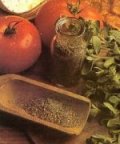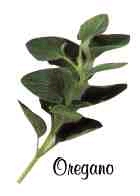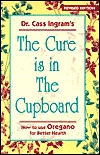The Cure Is In Oregano!! "Rigani"
A Magical Ancient Herb from the Land of Homer
A Natural Health Review
-- by Christos Papoutsy
***
 |
Our yiayiades and papoudes knew the benefits of oregano when centuries ago they began adding the magical herb oregano to almost all of their main meals. Its name derived from the ancient Greek word meaning, "joy of the mountains" (or "oreganum vulgarie" in Latin), oregano once grew on the hills and mountainsides of Greece and other Mediterranean countries. Familiar with the healing properties of this herb, the ancient Greeks frequently used oregano as a medicine - a favorite prescription of ancient Grecian physicians. |
Perhaps this is one of the reasons their ancient civilization was so powerful, both mentally and physically.
|
However, what became of this ancient remedy that we now rarely hear of outside of your average recipe book? Certainly such a potent medicine cannot be forever doomed to the kitchen spice rack. Ongoing research into this formerly trusted cure brings hope to the possibility that it might soon find its way into the medicine cabinets of the world once again. Researchers at the U.S. Department of Agriculture have determined that herbs are higher in antioxidant levels than fruits, vegetables and even spices such as garlic. Shiow Y. Wang, a biochemist at the USDA's Beltsville Agricultural Center in Beltsville, Maryland stated in the November issue of the Journal of Agricultural and Food Chemistry that the herb "oregano had 3 to 30 times higher antioxidant activity than other herbs studied." Additionally, oregano has 42 times more antioxidant activity than apples, 30 times more than potatoes, 12 times more than oranges and 4 times more than blueberries.
The proven abilities of oregano's antimicrobial properties have been extensively published and supported by significant research at the Georgetown University Medical Center in Washington, D.C., Cornell University, and the U.S. Department of Agriculture.
| To clarify, most of the "oregano" commonly used in Greek favorites such as Greek meatballs - "keftethes", siskebab - "souvlakia", lamb chops - "paithakia", Greek salads, and pizza, is the type purchased at spice counters and is not in fact oregano. Rather it is marjoram that is used most often in these familiar Greek meals. |
| All species of true oregano belong to the mint family, easily reconizable by the characteristic square stem and alternating pairings of leaves.Of the 60 plus species of oregano, or oregano-like plants, relatively few actually possess significant medicinal powers. To be medicinal, oregano must be made only from wild, mountain-grown, Greek or Mediterranean oregano, free of all chemicals and pesticides. It then must be emulsified in carrier oil such as extra virgin oil. Three oregano products that do contain significant medicinal powers are oil of oregano, oregano juice and crushed wild oregano. |
 |
The crushed wild oregano consists of the entire herb, and is almost entirely in its natural state. The only processing it undergoes is being sun dried. Oil of oregano, on the other hand, contains all the essential oil of the wild oregano plant. This is produced by the process of steam distillation.
|
Small samplings of conditions for which oil of oregano may be useful are:
Head and Neck - dandruff, headaches, sore throat, hair loss
Mouth - canker sores, cavities
Face - acne, rhinitis
Feet - athlete's foot, ingrown toenails
Masculoskeletal - arthritis, neuritis
*Be sure to see your physician before incorporating oregano products into your diet.
Our yiayiades and papoudes had wisdom - "sophia" - as they hand picked oregano and olives in their pristine, beautiful, untarnished wilderness of the Land of Homer. If you are interested in learning more, the writer recommends that its readers consider purchasing the book The Cure is In the Cupboard, by Dr. Cass Ingrams, with over 200 pages devoted to how to use oregano for better health. To order this book or to receive information on other books and cassettes on how to eat and live longer, call 1-847-473-4700. Fax 1-847-473-4780.
|
 |
We welcome and encourage your input on recipes that have been passed down through the ages, which incorporate oregano or olive oil. Please forward your recipes for posting to:
Hellenic Communication Services
E-Mail: helleniccomserve@aol.com
|




